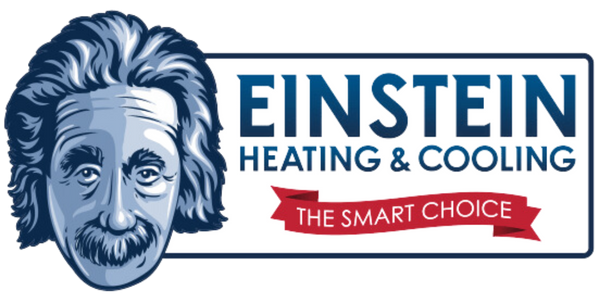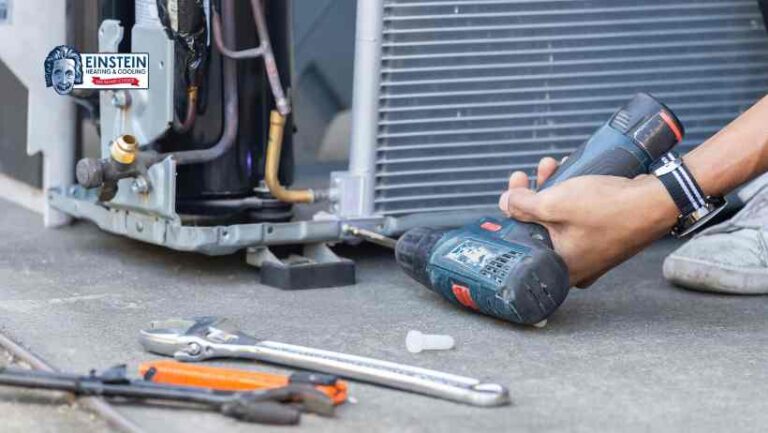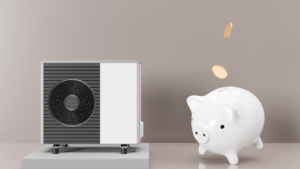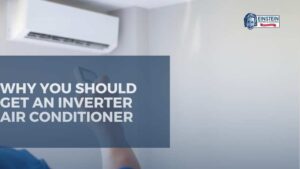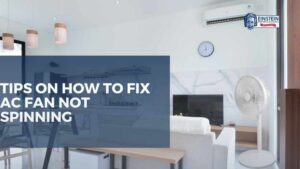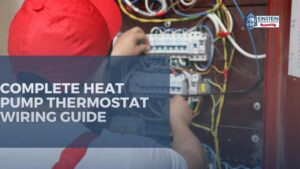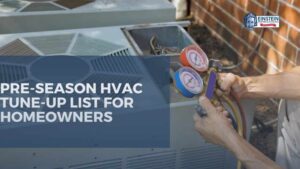If you are in search of solutions for “central air heat not working,” it is important that you understand what a central HVAC system is. A central air heating or central HVAC (Heating, Ventilation, and Air Conditioning) system is a comprehensive and centralized system designed to regulate and maintain the indoor climate of a building, typically a home or a larger facility. For this blog article, we will be focusing more on the heating aspect of the HVAC system. Addressing issues with central air heat not working in Phoenix requires a systematic approach to identifying and resolving the underlying problems.
What Is Central Heating?
The heating aspect of a central HVAC system involves a furnace or heat pump that generates warmth. This heat is then distributed throughout the building via a network of ducts and vents, ensuring a consistent and even temperature in every room. The system might use different methods to produce heat, such as:
- Furnace: A furnace has different types, commonly powered by gas, oil, electricity, or even alternative fuels, heats the air. This heated air is then circulated through ductwork into various spaces within the building.
- Heat Pump: A heat pump is a dual-purpose device that can both heat and cool a space. It transfers heat between the indoors and outdoors, extracting heat from the outdoor air (even in cold weather) and moving it inside to warm the building.
Ventilation and Air Quality
Apart from heating and cooling, central HVAC systems incorporate ventilation systems that ensure proper air circulation. This involves the exchange of indoor and outdoor air while filtering out pollutants and maintaining optimal indoor air quality. Ventilation helps in:
- Air Circulation: Moving air throughout the building, promoting fresh air intake, and preventing stagnation.
- Air Filtration: Filtering out dust, allergens, and other particles from the circulated air, improving indoor air quality.
Control and Regulation
Central HVAC systems are often equipped with a central control unit, typically a thermostat, allowing users to set and regulate desired temperatures. The system can be programmed to maintain specific temperatures at different times of the day, enhancing convenience and energy efficiency.
Ductwork and Vents
The network of ducts and vents in a central HVAC system is crucial for the distribution of heated or cooled air throughout the building. Properly designed ductwork ensures efficient airflow, allowing the system to function optimally and maintain consistent temperatures across all spaces.
In essence, a central air heating or HVAC system is an integrated solution that combines heating, cooling, ventilation, and air quality control to create a comfortable indoor environment throughout the year. Its centralized design provides convenience, efficiency, and precise climate control for residential and commercial spaces.
Factors Affecting Central Air Heat Functionality
Thermostat Malfunctions
- Inaccurate settings: Incorrect temperature settings or mode selection can result in the system not providing adequate heating.
- Power supply issues: Faulty wiring or power supply problems can render the thermostat ineffective, causing disruptions in the heating system’s operation.
Clogged or Dirty Filters
- Reduced airflow: Accumulated dirt and debris in the filters can block the airflow, leading to inefficient heating.
- Overworking the system: Clogged filters force the system to work harder, potentially causing overheating and malfunctions.
Ductwork Issues
- Leaks and blockages: Any leaks or blockages in the ductwork can obstruct the flow of warm air throughout the house.
- Insufficient insulation: Poorly insulated ducts can result in heat loss, thereby affecting the overall heating efficiency.
Pilot Light or Ignition Problems
- Gas supply issues: Problems with the gas supply can prevent the pilot light or ignition system from functioning properly.
- Malfunctioning thermocouple: A faulty thermocouple can cause the pilot light to go out, disrupting the heating process.
Faulty Components or Wear and Tear
- Aging system: Over time, components can wear out, affecting the overall functionality of the central air heating system.
- Motor or fan issues: Malfunctioning motors or fans can hinder the distribution of heated air throughout the house.
Thermal Sensor Problems
- Inaccurate readings: Faulty thermal sensors can cause the system to inaccurately gauge the indoor temperature, leading to irregular heating.
- Calibration issues: Improperly calibrated sensors can result in the system not turning on or off at the right times.
Electrical System Complications
- Tripped circuit breakers: Tripped breakers or issues in the electrical system can disrupt the power supply to the heating system.
- Wiring defects: Faulty or damaged wiring can impede the proper functioning of the heating system.
Maintenance Neglect
- Lack of regular servicing: Inadequate maintenance can lead to various issues, such as component degradation and reduced efficiency. In case of emergency heating, make sure to be prepared and read your system’s manual for help.
- Dirty coils or heat exchangers: Accumulated dirt on coils or heat exchangers can hinder the heating process.
Environmental Factors
- Extreme weather conditions: Drastic temperature changes or severe weather can strain the system, leading to temporary malfunctions.
- External debris or blockages: Debris, snow, or other external factors can obstruct the heating system’s operation.
Manufacturer Defects or Installation Errors
- Substandard equipment: Inherent defects in the equipment or poor quality installation can lead to heating system malfunctions.
- Incorrect installation: Improper installation practices can result in operational issues with the central air heating system.
Thermostatic Expansion Valve Issues
- Malfunctioning valve: Problems with the expansion valve can result in irregular heating patterns or insufficient heat production.
- Valve blockages: Blockages in the expansion valve can restrict the flow of refrigerant, affecting the heat transfer process.
Air Duct Size and Design
- Inadequate duct size: Ducts that are too small can restrict airflow, affecting the heating efficiency.
- Poor duct design: Incorrectly designed duct systems may lead to uneven distribution of heated air throughout the house.
Fixing Issues with Central Air Heat Not Working
When confronted with a malfunctioning central air heating system, resolving the problem involves a combination of troubleshooting techniques and potential fixes for the identified issues. Let’s delve deeper into the steps to rectify these problems and ensure a smoothly functioning heating system.
Troubleshooting Steps
Check the Thermostat
- Verify the settings: Ensure the thermostat is set to the correct temperature and heating mode for the desired comfort level.
- Power supply check: Confirm that the thermostat is receiving power and functioning properly. Replace batteries if necessary to guarantee uninterrupted operation.
Inspect and Replace Filters
- Locate the air filters: Find and inspect the filters for dirt, dust, or clogs that hinder proper airflow.
- Replacement or cleaning: Either replace the filters if they are too clogged or clean reusable filters thoroughly to promote optimal airflow and system efficiency.
Examine the Ductwork
- Look for leaks and blockages: Inspect the ductwork for any visible leaks, cracks, or blockages that impede the smooth flow of heated air throughout the house.
- Seal leaks and clear blockages: Use appropriate sealants to seal any leaks and remove blockages to restore proper airflow, ensuring consistent warmth in all areas.
Check the Pilot Light or Ignition System
- Verify the gas supply: Confirm that the gas supply is reaching the pilot light or ignition system, enabling proper heat generation.
- Test the thermocouple: Check the functionality of the thermocouple; replace it if it’s malfunctioning, as it’s crucial for the pilot light to stay lit.
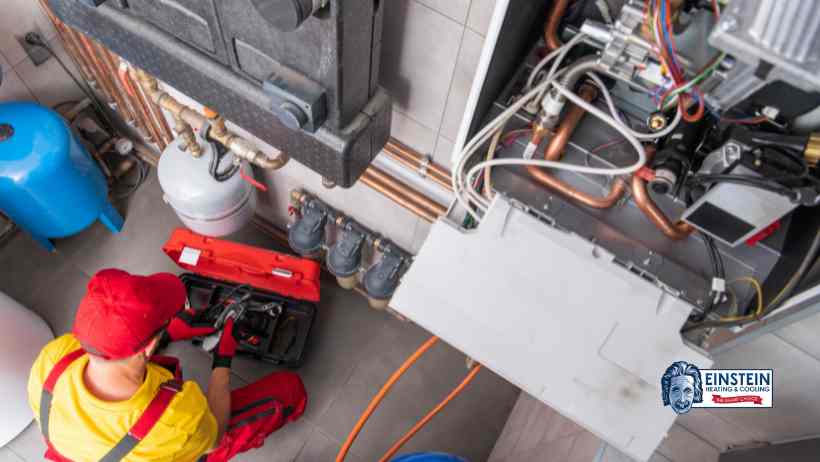
Inspect Components and Parts
- Assess for wear and tear: Examine all system components for signs of wear, damage, or malfunctions, and consider replacing faulty parts to restore efficiency.
- Check motors and fans: Ensure motors and fans are functioning properly without any obstructions, enabling the even distribution of warm air.
Additional Steps for Repair
Calibrate or Replace Sensors
- Calibration check: Calibrate the thermal sensors to ensure they provide accurate temperature readings, crucial for proper system operation.
- Replacement: If the sensors are malfunctioning or providing inaccurate readings, consider replacing them to restore precision in temperature control.
Address Electrical System Issues
- Reset circuit breakers: Reset any tripped circuit breakers to restore power to the heating system and ensure the correct voltage supply.
- Repair wiring: Identify and repair any faulty or damaged wiring that might be causing disruptions in the system’s operation, restoring seamless functionality.
Regular Maintenance
- Schedule professional servicing: Engage a professional service provider for routine maintenance to prevent future issues and maintain the system’s efficiency.
- Clean coils and heat exchangers: Regularly clean these components to prevent dirt buildup that can hinder the heating process.
Consider Environmental Factors
- Prepare for extreme weather: Ensure the system is well-prepared to handle extreme temperatures or harsh weather conditions without compromising its functionality.
- Clear external blockages: Regularly inspect and remove any debris, snow, or obstructions that might impede the system’s operation, enabling unhindered airflow.
Professional Assistance for Manufacturer Defects
- Contact the manufacturer: If you suspect inherent defects in the system, reach out to the manufacturer to address and rectify these issues.
- Seek professional installation help: For installation errors, consider consulting HVAC professionals for reinstallation to ensure proper system functioning.
Advanced Repair Actions
Address Thermostatic Expansion Valve Issues
- Adjust or replace the valve: Adjust the valve settings or consider a replacement if it’s malfunctioning, ensuring optimal refrigerant flow for efficient heating.
- Clear blockages: Eliminate any obstructions that might restrict the valve’s function, allowing for the unrestricted flow of refrigerant for consistent heat transfer.
Rectify Duct Size and Design Issues
- Redesign or replace ducts: Consider redesigning or replacing ducts to ensure appropriate size and design for efficient airflow and consistent heating throughout the house.
- Professional consultation: Engage HVAC professionals to assess and reconfigure the ductwork for better heating distribution, ensuring a more balanced and evenly heated environment.
Maintenance and Upkeep for Central Air Heat
Regular Inspections
Thermostat Calibration
- Ensure accurate temperature settings to prevent issues with central air heat not working.
- Calibrate and test the thermostat regularly for precision.
Air Filter Maintenance
- Regularly inspect and replace air filters to prevent blockages hindering airflow.
- Clean or replace filters based on the manufacturer’s recommendations.
Ductwork Examination
- Periodically check for leaks, blockages, or poor insulation in the ductwork.
- Seal leaks and insulate ducts to maintain efficient heating and cooling.
System Cleaning
Coil and Heat Exchanger Cleaning
- Clean coils and heat exchangers to prevent accumulation of dirt that can hinder heat transfer.
- Ensure these components are free of debris for optimal functionality.
Vents and Registers Cleaning
- Regularly clean your HVAC system, especially the vents and registers to ensure unobstructed airflow.
- Remove any dust or debris that might block the passage of air.
Professional Servicing
Scheduled Maintenance by HVAC Professionals
- Arrange annual or bi-annual check-ups by certified HVAC technicians.
- Address any potential issues before they lead to central air heat not working.
Component Check and Lubrication
- Have professionals inspect and lubricate moving components to prevent friction and wear.
- Ensure all parts are in good condition and functioning properly.
Weather-Specific Measures
Winter Preparations
- Ensure the system is prepared for increased use during colder months.
- Insulate exposed pipes and outdoor units to prevent freezing.
Summer Readiness
- Prepare the system for increased demand during warmer seasons.
- Ensure proper airflow and cooling functions are operational and efficient.
Energy Efficiency Considerations
Energy Audits
- Conduct periodic energy audits to ensure the system operates efficiently.
- Implement energy-saving measures recommended by professionals.
Smart Thermostat Installation
- Consider upgrading to a programmable or smart thermostat for better energy management.
- Program settings to optimize energy usage without compromising comfort.
Safety Checks
Carbon Monoxide and Smoke Detector Inspection
- Regularly check and replace batteries in detectors to ensure safety.
- Install carbon monoxide detectors near the heating system.
Gas Leaks and Flue Checks
- Inspect for gas leaks and ensure the flue is functioning properly.
- Any unusual smells or leaks should be addressed immediately by professionals.
In Conclusion
Regular maintenance, prompt identification of issues, and professional assistance from Einstein Heating and Cooling when needed are essential for ensuring the smooth operation of your central air heating system, maintaining a comfortable environment within your Phoenix home. By meticulously identifying and rectifying these issues, you can restore the functionality of your heating system, ensuring a comfortable and well-heated indoor environment.
